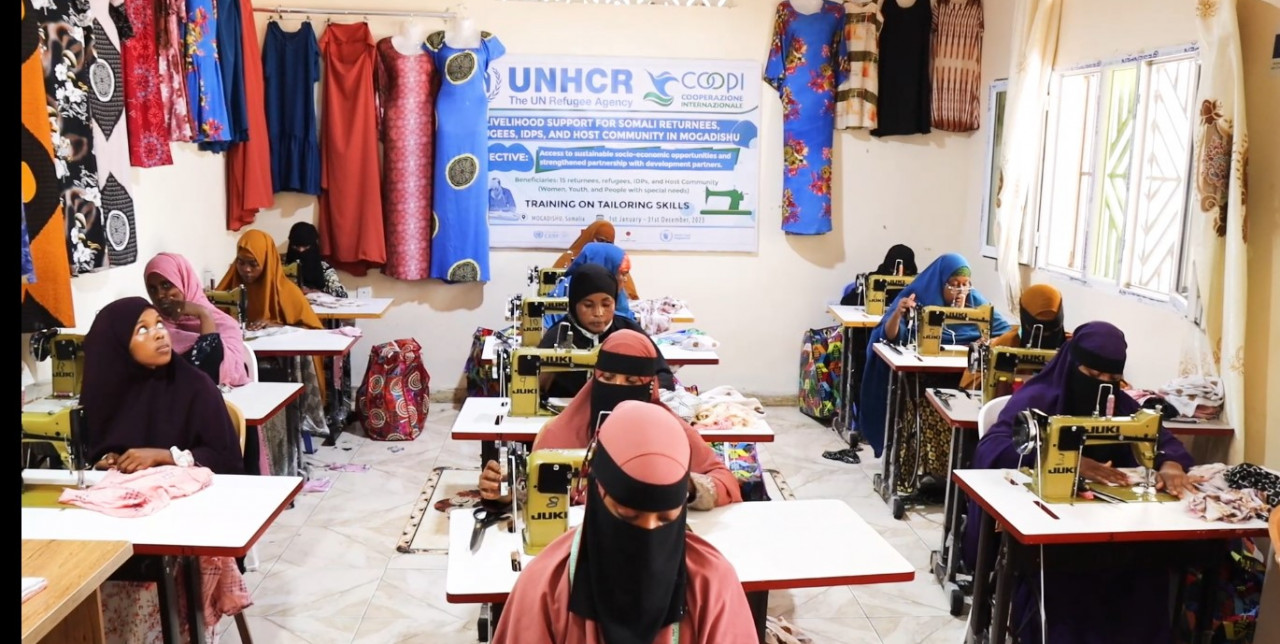16-12-2023 | di COOPI
Carpenters, mobile phone repairers, tailors and plumbers. In Somalia, refugees, former migrants, and displaced people have a new opportunity
Eight months were needed for Abubakar Abdi Mohammed to obtain his carpenter's certificate in 2023 and learn one of the most sought-after trades in his area. During the course, promoted by COOPI – Cooperazione Internazionale in the framework of the UNHCR - funded project "Promoting self-sufficiency and livelihoods of Somali returnees in south-central Somalia" throughout 2023, Abubakar learned how to make beds and pantries.
Ahmed Aweis Mohammed, the teacher, says that the course aimed to train 30 students precisely in the construction of various types of furniture, such as bed furniture, wardrobes, drawers, and generally everything that is needed in a home.
This - he explained, - will help these young people to have skills that are in demand on the market and thus improve their future."
In fact, the course is part of the vocational and entrepreneurial training activities carried out under the project to support communities affected by displacement in Somalia: primarily Ethiopian refugees, Kenyans and those from the Arabian Peninsula, but also internally displaced persons, repatriated former Somali migrants and vulnerable members of host communities.
10 are, for example, those who had the opportunity to learn how to repair a telephone; among them Hassan Isse Abdullahi, arriving from Dagaxley camp in Dadab, Kenya.
I was taught how to repair a screen, chargers, and speakers," he says, "and thanks to this opportunity I can help my family."
Jama Dahir Nuur, his teacher, who has been working as a computer repairman since 2008 and has been teaching young people how to build a future for more than ten years, says that thanks to the skills learned most of his students are now working and can support their families.
After an unsuccessful migration experience and a return to Somalia, Abdikani Abudllahi Aden is also among those who had the chance to get involved, in his case with plumbing training. After two months of training, he exclaims:
Before I didn't understand anything, now Insha Allah and thanks to COOPI, and UNHCR I know how to do repairs”.
Sheikh Omar Abdikadir Ibrahim, who hold the courses, which is also eight months long, assures that it will finish on time without skipping any basic plumbing principles so that the students can immediately gain from the skills they have learned.
As a result of the number of nationwide crises and due to conflict, refugees, returnees and internally displaced persons in Somalia have a life full of hardships, exacerbated by insecurity and recurring climate shocks. As extreme poverty traps families in a vicious cycle of dependence on external assistance, the project-whose activities are carried out in Beletweine, Baidoa and Mogadishu districts-is aimed precisely at equipping beneficiaries with skills crucial to achieving economic self-sufficiency.
The courses planned are of various kinds: carpentry, computer repair, plumbing, aesthetics, and tailoring. For example, there is a course designed to enable 15 women - also vulnerable Somalis or migrants, especially Yemenis - to learn tailoring that lasts only one semester.
Fowsiya Ali Mohamud, for example, is a Kenyan refugee from Dadab camp who arrived in Mogadishu in 2017 and tells us that thanks to the course she learned how to sew hijabs, dirac (typical Somali robes) and formal dresses.
In response to the multiple crises the country suffers from, COOPI has been working in Somalia since 1984 to build long-term resilience and empower the vulnerable Somali population and refugees to act proactively and with sufficient economic means in emergencies.




 Somalia
Somalia